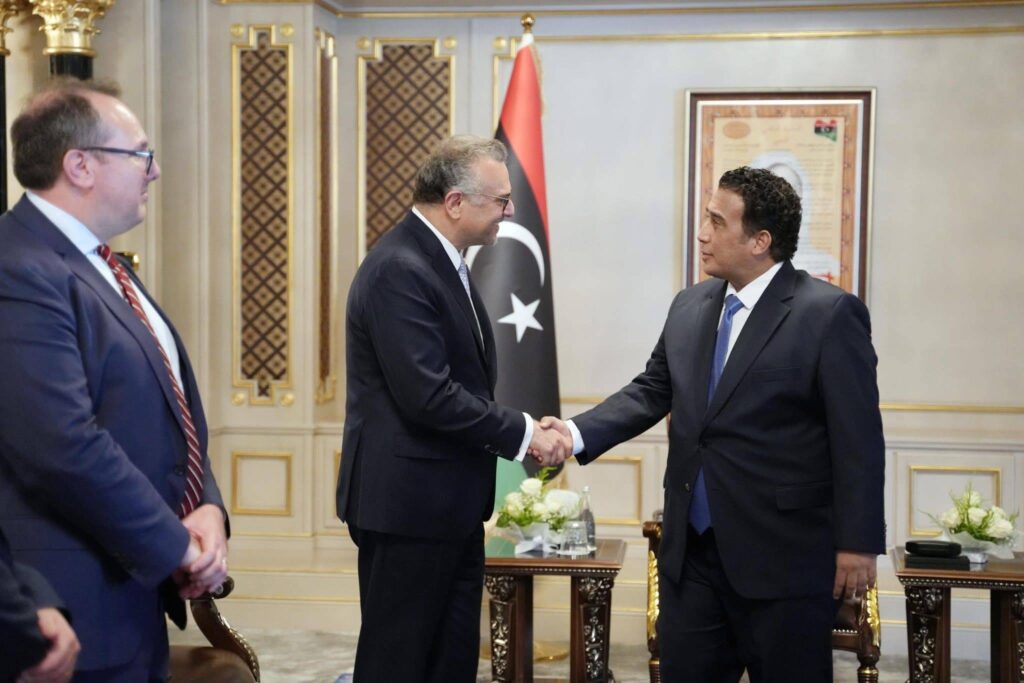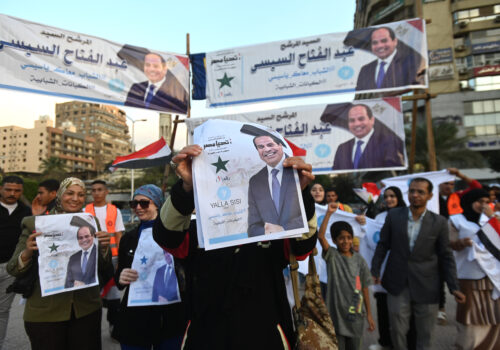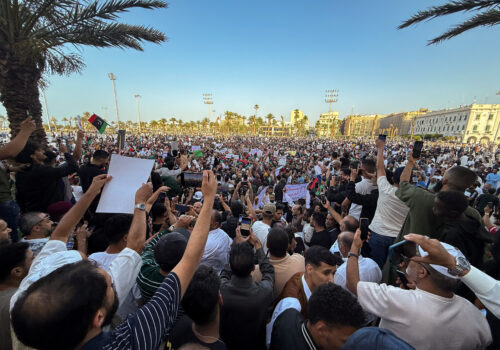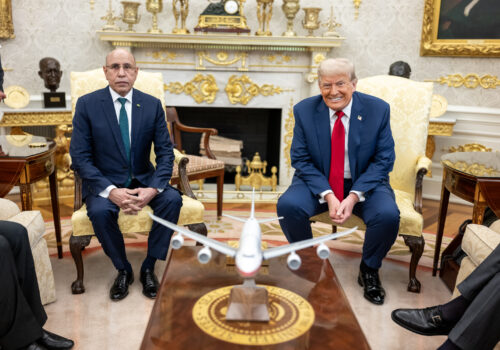In the final days of July, Massad Boulos, the US senior advisor for Africa, visited several countries in North Africa.
Overall, his visit reflected the Trump administration’s “deals, not aid” approach, which is intended to shift foreign policy from values-based principles to a more transactional strategy. Nevertheless, Boulos was warmly received during his visit, particularly in Algeria and Libya, a signal that US influence remains strong in these North African countries and that the current administration could still have a significant impact in solving some of the region’s most pressing issues.
During his first stop, Boulos met with Tunisian President Kaid Saied and later with Foreign Minister Mohamed Ali Nafti to discuss bilateral ties and strengthening collaboration on fighting terrorism and boosting trade. Saied reiterated his stance on noninterference by external governments, which he has stood by since coming to power in 2019—and especially so in response to international criticism of his jailing of opposition voices, lawyers, and journalists. He also used the occasion to champion the Palestinian cause, showing Boulos a picture of starving children in Gaza, which appeared to cause a moment of tension between the two leaders.
Several issues were notably absent from the conversation. One such issue was migration: Illegal migration from North Africa to Europe has recently increased, and Tunisian border police have been dismantling makeshift migrant camps to avoid a further surge in migration to Europe. Such surges, especially if sudden, can present significant challenges for Europe, a key ally and trading partner of the United States. In the past, and especially under the Biden administration, the thorny migration issue has been a topic of interest for European leaders during bilateral talks with the United States. For example, in July 2023, Italian Prime Minister Giorgia Meloni met with former US President Joe Biden. The official communiqué emerging from the meeting highlighted migration from Tunisia as a key issue, an addition that may have been made to secure Italy’s continued support for Ukraine.
Today, migration is still a top issue of national interest for Europe. And at a moment when transatlantic cooperation is so critical for a number of US priorities, including countering Russia, a Europe destabilized by uncontrolled migration may come at great costs for the United States. However, by overlooking the North African migration issue while visiting Tunisia, Boulos missed an opportunity to send an important signal of unity to the United States’ transatlantic allies, especially as Europe grows more and more concerned about Russia cooperating with Field Marshal Khalifa Haftar in Libya on weaponizing migration against Europe.
Similarly, it does not appear as though Boulos addressed the issue of US aid (frozen under the Biden administration), consistent with Trump’s shift away from aid and toward a more transactional and business-oriented approach. The United States was one of Tunisia’s largest sources of foreign aid, providing hundreds of millions of dollars in assistance, later cutting much nonmilitary aid after Saied tightened his grip on power in July 2021.
Also absent from the conversation, at least according to publicly released reports, were Tunisia’s stalled negotiations with the International Monetary Fund (IMF), which have been paused since 2023, when Saied accused the organization of imposing strict conditions on the country. Tunisia is in immediate need of support and reform; the economy remains vulnerable, with unemployment at 15.7 percent and a widening trade deficit (from $2.79 billion to $3.46 billion in the first quarter of 2025). But without IMF support, the country’s economy risks tanking even further, incentivizing migrants to cross illegally into Europe. Given that the United States is the largest shareholder of the IMF, it holds significant influence and leverage, but the apparent lack of mention of this issue at the Boulos visit was a missed opportunity to try persuading Tunisia to go back to the negotiating table.
Trump’s foreign-policy stance was particularly evident during Boulos’s trip to Libya, with the signing of an eight-billion-dollar oil and gas exploration deal. The project at the center of the deal is set to begin in 2026 and will see US construction consulting company Hill International work with Mellitah Oil and Gas (a joint venture of Libya’s National Oil Corporation and Italy’s Eni) to boost Libya’s oil output and direct oil exports to Europe. The agreement’s current goal is to ramp up gas production to 750 million cubic feet of gas per day with the construction of additional gas fields.
The deal was facilitated by ongoing backchannel cooperation happening in the two rival governments, between the Tobruk-based one headed by Haftar and the one based in Tripoli (and recognized by the United Nations), led by Prime Minister Abdul Hamid Dbeibah. While at loggerheads over most other issues concerning the country, resulting in a prolonged civil war, the two sides collaborate on matters concerning oil and gas, as these form the bedrock of Libya’s economy. During his trip, Boulos met with both Dbeibah and Hafter, signaling a continuation of the US posture of legitimizing both governments despite the United Nations’ stance.
In Algeria, Boulos was warmly received by Algerian President Abdelmadjid Tebboune, likely in part the result of a military agreement the United States signed with Algeria earlier this year, which pledges cooperation between US and Algerian troops and paves the way for potential weapons sales. This warm welcome is a good sign for advancing US influence in the region. Algeria, since Morocco joined the Abraham Accords in 2020 and since the United States recognized Morocco’s sovereignty over Western Sahara, has been isolating itself from the United States and growing closer to longtime ally Russia. For example, it applied to become a BRICS member in 2023 (but later withdrew it after growing frustrations because it was excluded from that year’s summit) and signed a Declaration of Enhanced Strategic Partnership later that same year. With Algeria spending the most on its military among African countries, a military that sources much of its weaponry from Russia, the US-Algeria deal reflects Washington’s foreign-policy strategy to, through deals, keep Algeria balancing between the two superpowers, positioning it as a potential swing player in the broader great-power competition.
Despite the warm welcome, it is safe to assume that Tebboune was disappointed by Boulos’s reiteration of the United States’ stance in support of Moroccan sovereignty over Western Sahara. Algiers supports Western Sahara’s independence and it is unlikely this position will shift any time soon, particularly after fifty years of tension and periodically conflict. Thus, Algeria may begin to more strictly isolate itself from the United States and look for increased support elsewhere—for example, China and Russia—and continue exerting influence in neighboring Tunisia. Algeria’s continued isolation could pose challenges for a number of US partners, including European allies such as Italy, which heavily rely on energy exports from Algeria following efforts to reduce dependence on Russian gas and oil. This enables Algeria, if it does stand firm on its isolation, to have more leverage in attempting to shift the balance of power to its favor vis-à-vis the Western Sahara issue.
Nonetheless, Boulos’s visit yielded positive results, showcasing that the United States still considers the region important and central to Washington’s foreign policy, particularly as it looks to manage global competition with China and Russia—and as other countries consider tilts eastward.
Alissa Pavia is the associate director of the North Africa Initiative at the Atlantic Council’s Rafik Hariri Center & Middle East programs.
Further reading
Thu, Jul 3, 2025
How the war in Gaza diminished dreams of political reform in Egypt
MENASource By
Egypt's national debate has shifted from reform to national security with just weeks ahead of parliamentary elections.
Tue, May 27, 2025
Beyond ceasefires: Reimagining stability and engagement in Libya
MENASource By
With all major political institutions mired in crisis, a renewed approach to peace enforcement is pivotal to building stability.
Wed, Jul 16, 2025
How Mauritania-Israel normalization may boost US posture in the Sahel
MENASource By Sarah Zaaimi
If Mauritania is nearing a deal with Israel, this could be the beginning of a wider re-engagement with Sahel countries.
Image: President of the Libyan Presidential Council, Mohamed Menfi, receives US Presidential Advisor for Africa and the Middle East, Massad Boulos President of the Libyan Presidential Council, Mohamed Menfi, receives US Presidential Advisor for Africa and the Middle East, Massad Boulos, in Tripoli, Libya, on July 23, 2025. Photo by Libya Presidency Office apaimages libya libya libya 2230725_Libya_LPO_002 Copyright: xapaimagesxlibyaxPresidencyxOfficexxapaimagesxNo Use Switzerland. No Use Germany. No Use Japan. No Use Austria



